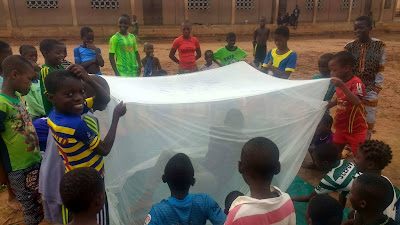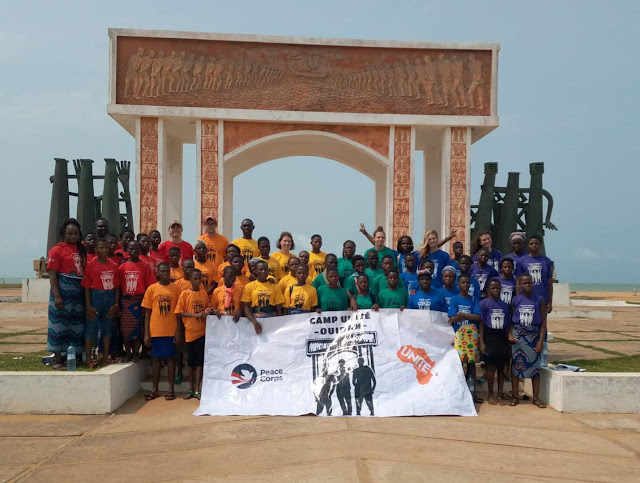Do They Know It's Christmastime?
It has been quite a change being away from Minnesota this Christmas season. In fact, I often forgot it was time for roasting chestnuts as I was too busy roasting in class from the afternoon heat. Neither did I try to create mistletoe magic with moringa or decorate a palm tree with ornaments. Don't get me wrong, for all has still been appropriately holly and jolly this Christmastime. It kicked off with a Thanksgiving dinner of chicken and potatoes to promote peace, friendship, and grace among the multinational composition of trainees and staff. It progressed as newly-minted volunteers hummed Christmas music and decorations lined the streets of Lokossa and Cotonou. Now I'm site where I've often blasted Christmas music on my computer speakers as community members living abroad in Nigeria have trickled in for a long weekend of holiday festivities.
I enjoyed being away from the American airwaves this holiday season and getting the chance to be selective with which tunes render me full of wholesome joy and cheer. There is one song that I cannot put up with, and I included fellow volunteers in my pain by singing it whenever it was lodged in my head. Such a song is "Do They Know It's Christmastime" by Band Aid.
The song was released back in 1984 in response to the devastating famine in Ethiopia, a crisis of disastrous drought and human rights abuses that led to the deaths of more than 400,000 people. Boomtown Rats singer Bob Geldof wrote and produced the song with Midge Ure to feature Britain and Ireland's most famous musicians and raise funds to fight the famine. In this regard the song is brilliant. Geldof combined the best way to bring Christmas cheer (singing loud for all to hear) with humanitarian fundraising. Plus, it sure is better to capitalize on stardom for a good cause than to release another hackneyed edition of "White Christmas." It's a win-win, and the tune is catchy too.
Going beyond the catchy and vaguely sitcom theme-like melody, however, brings us to the lyrics. The chorus, for example, rings out something like:
"And there won't be snow in Africa this Christmastime
The greatest gift they'll get this year is life
Where nothing ever grows
No rain nor rivers flow
Do they know it's Christmastime at all?"
To Geldof's defense, he was writing about the famine in Ethiopia where the crisis did probably take precedence over watching "Rudolph the Red-nosed Reindeer." He also wanted reference to Ethiopia specifically, but his studio superiors rejected it. But because of the lyrics and the song's continual airtime outside of the context of the Ethiopian famine, the song paints a picture every holiday season of a snow-less, river-less, helpless, and ignorant Africa. Don't pay heed to the fact that there's no snow in Miami either, or that there's no snow in Africa because it's either summer in the south or, like mount Kilimanjaro, bearing the brunt of climate change. Don't mention either that Benin is upwards of one-third Christmas-celebrating Christians, and some other African countries are majority Christian. It's best not to recognize as well that some of the fastest growing economies in recent years are situated on the continent. Africans are the object of our pity and charity, and all we must do is shed a tear as we write our check.
I'll quit the badgering and get to my point, seeing as I'm certainly not the first to critique this holiday megahit. Songs like this one and countless commercials, headlines, stories, movies, and other media perpetuate an image of African peoples as helpless, hopeless, ignorant, and in need of your immediate help. There are no ifs, ands, or buts, nor fact-checking or hearing from an African voice itself. The reality, of course, is that life and society are just as nuanced and complex in Benin and elsewhere on the continent as they are in the States. I know this is painfully obvious to many of my readers, but it's an integral part of sharing the Peace Corps experience.
It's easy for Peace Corps Volunteers to fall into the Geldof trap. We are tasked with sharing host country culture, our experiences, and work with Americans as Goal 3 of the Peace Corps Mission. In describing our work, we could easily fail to mention our community partners and empowered community members (if we're doing our work well). Talking about poverty could also engender more pity than empathy. In describing cultural elements or geography, we risk exoticizing a normal way of life for millions of human beings or reducing a country to its pretty rocks and trees. In response, Peace Corps Benin ran a recent training session on privilege and how we share our experiences on social media. The grand takeaway was to never picture or post what you wouldn't in the States or, better yet, always ask for consent and provide context. (You can read our guiding articles here and here.) We are not "White Saviors" here to end all poverty as we know it. As a result, our social media postings ought to center and give voice to community members whenever they are present. Posts should approach our goals of cultural exchange and promoting the integrated fight against the roots of global poverty. (An excellent article on the topic can be found here.)
Context! The ride to and from my local market has spectacular
views of Lac Ahémé. Photo credit: Brice, my work counterpart,
who loves the views too
More context! This garden is run by a group of women who sell
the produce at the local market. They practice integrated composting and
soil protection practices by covering seed beds with dying vegetation.
With this post I hope you've gained a tool for understanding life here in Benin. Even if I haven't shared the details, you know they are numerous, nuanced, and worthy of reflection. You should also comfortable in holding me accountable to share my experiences responsibly. Send me an email or Facebook message if anything I write or share fails to meet our standards. Beninese people obviously know it's Christmastime, and Christian and non-Christian houses alike celebrated. Keep that in mind the next time you give Band Aid a listen. Just try not to get the song stuck in your head like me.






Comments
Post a Comment